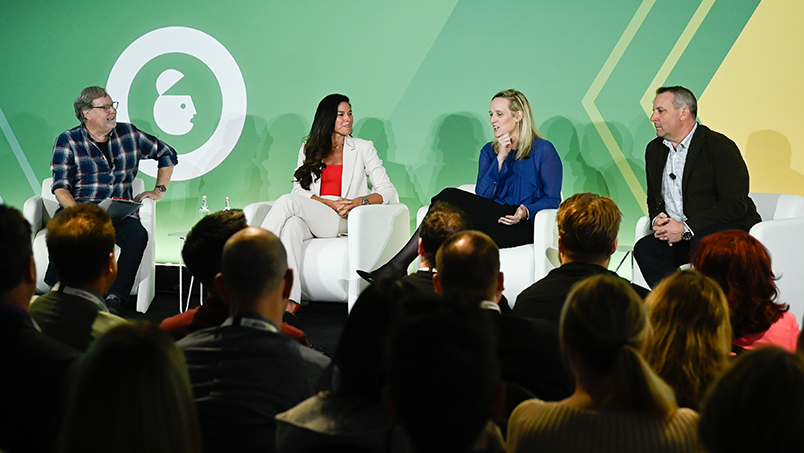‘Same shit, same tonnage’: GroupM, Mediabrands, Initiative CEOs lament lack of agency innovation, short-term focus, client ‘expectations delta’ and too removed from ‘reality of middle Australia’

Media chiefs: Greg Graham hosts a panel featuring Melissa Fein, Aimee Buchanan and Mark Coad
Media agency bosses want adland to innovate more and up-end how they've operated for at least two decades. Challenging economic headwinds has placed pressure on clients, who are holding back budgets, for now, while their expectations on what agencies can deliver are inflated. Media fragmentation presents a rising conundrum for the market and the current economic conditions are restraining more progressive leaps into sustainable comms in favour of business performance objectives.
Media agencies have been too slow to embrace innovations that could shift the industry needle and improve the diversity of their workforce to better represent Australians, a panel of media agency bosses admitted yesterday at Advertising Week APAC.
In a discussion about Power, Innovation and the Issues that Matter, Group M CEO Aimee Buchanan, IPG Mediabrands boss Mark Coad and Initiative ANZ lead Melissa Fein laid bare the issues that have held the industry back and could help elevate its impact on clients and society at large. In a separate AdWeek session about the role of Generative AI in marketing, WPP AUNZ President Rose Herceg said that AI won’t kill jobs but could revolutionise marketing provided it is used wisely. She urged the industry to not wait for regulators to catch up with the tech.
Among the major gripes of agency chiefs, per Fein, was that although creative and media agencies have produced outstanding examples of innovative work, the industry is “definitely not innovative enough.
“Our industry as a whole is not really moving the needle on some of the most important issues," Fein said. "[Although] we are getting somewhere on automation, we're not using AI tools and the technology as we could be and moving faster. We have been doing things the same way for the past 25 years, such as the way we plan, the way we get paid by clients and the way we pay our staff.”
Buchanan agreed but said that while agencies thrive in innovation for clients, the industry has sometimes neglected innovation internally.
Coad, who started his career 30 years ago as a media assistant checking confirmations and “doing key numbers”, admitted “in a media agency we haven’t done a lot to change that up, we are still doing the same shit and same tonnage of stuff”.
The Mediabrands boss said that agencies have become much better in the way they treat staff and have eliminated a lot of menial and manual tasks but the real opportunity was to “shift the needle on major cultural issues”, citing Dove’s Real Beauty campaign to build self confidence in women as an example.
The expectations delta
One of the pressing issues in conversations between clients and media agency partners is a “delta” between the expectations of stakeholders and the services agencies are capable of delivering.
“There appears to be a universal delta between the way many companies performed in recent years versus the headwinds they are now facing. Stakeholder expectations have not matched that. That expectation delta is happening across the industry, including clients, media owners and agencies,” Coad warned. He again flagged that the industry needs to come up with a more sustainable business model in which agencies are remunerated for the value they provide and not “procured within an inch of our lives” and “we're happy to cut each other's throat for when. In the long-term we pay for that.”
Many marketers, argued the panel, are treading through the uncertainty with caution, including around audiences that are shifting away from linear TV into streaming services and other channels.
“There’s more fragmentation and disruption that we now have to deal with. Linear TV audiences declined by 20 per cent and some have streaming services. We're having to think about that quite differently,” Buchanan said.
Another issue was that the industry can sometimes be divorced from the economic reality facing many Australians, particularly "middle Australia".
"We talk to the businesses who are at the coalface of that, people aren't buying as much," Buchanan said. "They're buying more pasta and beans. There's 800 small businesses that shut down last month and another 600 are about to shut down. So I do think we get into our own little bubble. And we have slowly started to illustrate they're not as comfortable as many of us in this room."
Although there has been progress on gender diversity, media agency leaders accept that more could be done to hire talent from a wider pool that better represents the diversity of Australia. Buchanan said there are “pockets of progress” but admitted the advertising industry doesn’t represent the diversity in Australia.
Initiative’s Fein added: “It's a frustration...[and] something that I am very passionate about, and our team is passionate about, but it's going to take generations to break the cycle. The pools that we are fishing in need to be wider. Our industry is so wonderfully democratised where you don't have to have a university degree."
Buchanan and Fein both want the industry to take a longer term view on how agencies operate and influence culture and society, including on issues like sustainability.
“We critique our clients about measuring short term objectives within the next sale. But in fact, I think we all could take a longer term view on what we want this industry to represent," Buchanan said.
Per Fein: “What we're finding is that our clients are actually really struggling to forecast what FY24 looks like for them, and into some of the new calendar year, because of that really divided audience behaviour.
"Some of the brands and clients that we're working with have done some unbelievable sustainability initiatives that we're proud to partner with, but we're seeing that come back with some of the economic headwinds where it's become expensive."



